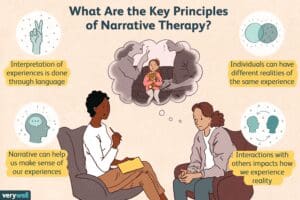Therapy That Can Teach You Forgiveness
We all know that the ability to forgive someone is a valued human trait. But dang is it hard to do. If you’re a human, then you’ve experienced a situation where you’ve been wronged by someone else (and vice versa). Most people want to be known as “forgiving,” but there are few manuals on how to do just that. This is where therapy comes in. It turns out that forgiveness is as much a skill that requires practice and coaching. Therapy is that coaching…and specifically Narrative Therapy. Read on to learn about a therapy that can teach you forgiveness.

Infographic courtesy of VeryWell Mind.
Forgiving requires changing the narrative
A recent episode of the podcast Speaking of Psychology: The power of forgiving those who’ve hurt you, with Robert Enright, PhD discussed the topic of forgiving a person who has died. Narrative Therapy works well alongside forgiveness. In the podcast, Dr. Enright reminds me of how I work with my clients around changing the narrative of the situation, and in this case, forgiving someone.
If the person believes that the one who passed can be forgiven, then using Narrative Therapy by creating a memorial bench or visiting the gravesite and leaving flowers could help stop the “drips of anger” that Enright references. However, if one believes that the person who has passed cannot be forgiven, then understanding that the person cannot cause them further harm is important to acknowledge.
Using Narrative Therapy could also help change the narrative that once was, externalize the narrative, and create a new one to help the one heal. Narrative Therapy gives you the power to externalize the situation, look at it from an outside point of view, find unique outcomes, and help create a new narrative regarding the specific situation.

Dr. Frederic Luskin (pictured here) is the Director of the Stanford University Forgiveness Project.
But it also takes accepting that some do not want to forgive
It is crucial, as Dr. Enright states, to accept the people who do not want to forgive, as well as accept the people who do. Leaving it up to the person who was wronged and respecting their choice is in my opinion, the best thing to do. It is important that we give people time to forgive, as it might not happen overnight. Being understanding of the person going at their own pace is extremely crucial.
Boundaries are important when it comes to forgiveness, and as I mentioned previously, respecting the person’s pace is crucial. What happens when we set a boundary for ourselves and another person gets upset that we set one? In this instance, it is important to reflect on the reasons why you set the boundary in the first place and be confident in the boundary that you set. If one feels the need, they can express to the person with hurt feelings, that it was not their intention, and it has nothing to do with the other person, and more to do with protecting oneself.
There have been instances where I have been asked to give forgiveness. During that time my anger was at the forefront of my being, which clouded how I looked at the specific situation. Over time, and as I got older, I realized that the only person who was hurting from not forgiving was me. It takes more effort to be angry or upset with someone than it does to forgive them. That does not mean you have to formally forgive them. It is acceptable to make peace with what happened even if you don’t talk to the person about it. At the end of the day, the forgiveness should be for yourself, and not anyone else.
Narrative Therapy is a great way to help one begin exploring forgiveness and open one’s eyes to understanding that they have the power in the situation.
About the Author
Meghan Rydzewski, MFT, is a New Jersey Staff Therapist at the Council for Relationships. If you have questions about forgiveness, Narrative Therapy, or about Meghan’s availability to see new clients, go here.
See our Therapist & Psychiatrist Directory to find a different CFR therapist or psychiatrist near you.
More from CFR

